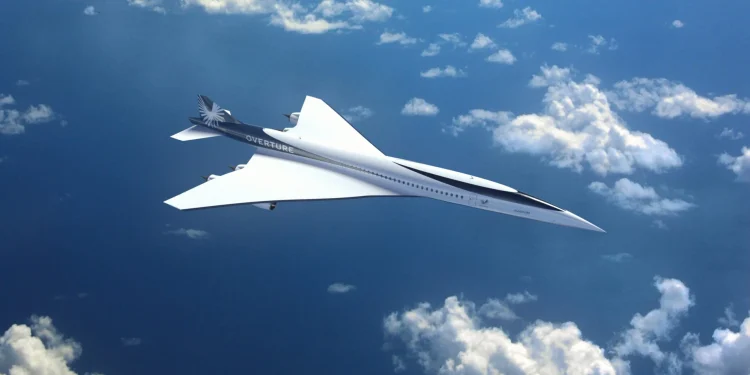By Maria Kalamatas
Denver, CO —
Boom Supersonic, the aerospace startup best known for its ambitions to revive commercial supersonic travel, has quietly begun pivoting toward a high-value logistics model with the announcement of cargo capabilities in its Overture aircraft program.
While originally conceived as a 65–80-seat passenger jet, Boom’s CEO Blake Scholl confirmed last week that the company is designing a variant of the Overture specifically for time-critical cargo, marking a notable evolution in the project’s commercial roadmap.
“We’re speaking with global logistics leaders right now,” Scholl said in a closed industry session in San Francisco. “What we’re hearing consistently is that there’s a premium segment of air cargo—medical, luxury, high-tech—that demands next-level speed. And Overture is uniquely built for that.”
A natural niche: Speed meets precision
With a projected cruising speed of Mach 1.7 and a range of 4,250 nautical miles, the cargo-configured Overture could cut transatlantic freight delivery times by more than 50%. While Boom has not disclosed target launch clients, industry insiders suggest advanced talks with FedEx and SF Express are underway.
“Overture’s commercial cargo variant would dramatically shift how we think about time-sensitive global supply chains,” said Amira Singh, Global Cargo Strategy Director at McKinsey & Co. “It may be niche, but the margins are compelling.”
Aerospace evolution driven by logistics
Boom’s shift is part of a broader trend. With increasing competition from hypersonic and suborbital developers, the company is seeking differentiated applications beyond passenger transport.
By dedicating part of its production line at the Greensboro, NC facility to cargo-specific designs, Boom hopes to accelerate regulatory pathways and sidestep the higher scrutiny faced by passenger aircraft. “Cargo certification is more straightforward in some aspects,” noted aerospace legal expert Daniel Morales. “It’s a smart entry strategy.”
A nod from regulators, cautious optimism from carriers
While the FAA declined to comment on the specifics of Boom’s cargo ambitions, one senior official acknowledged that “a well-documented cargo-only supersonic use case could be a proving ground” for broader acceptance of faster-than-sound transport.
Airlines, meanwhile, remain cautious. “The technology is exciting, but until we see proven fuel efficiency and handling cost per kilo, we’re on the sidelines,” said Marcus Webb, Head of Fleet Strategy at Lufthansa Cargo.
Looking ahead: Targeting 2029 launch
Boom has announced no change to its projected first flight timeline, still aiming for 2027, with entry into service by 2029. Cargo will now be developed in parallel with the passenger model.
For the logistics industry, it could signal the return—not of Concorde-style glamour—but of an ultra-premium cargo segment that hasn’t existed since the Cold War era.
“Time is value,” said Scholl. “And supersonic cargo could redefine both.”























